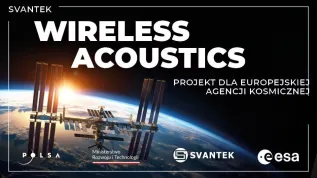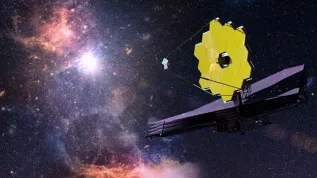
A Polish company specializing in space engineering will coordinate the construction of an antenna system for communication with Earth for the European Space Agency’s large mission ARIEL.
As part of the mission, a space telescope will be built to study exoplanets and their atmospheres.
Sener Polska has become the coordinator of the medium gain antenna system for the European Space Agency's ARIEL mission.
The Atmospheric Remote-sensing Infrared Exoplanet Large-survey (ARIEL) is a medium-class mission that is creating a space telescope designed to study exoplanets.
The instrument, scheduled for launch in 2029, is intended to enable the analysis of the atmospheres of distant globes. Thanks to its observations, it will be possible to better understand the formation and evolution of exoplanets. The telescope will also enable detailed studies of the planets of the Solar System.
The medium gain antenna is designed for the telescope's communication with the Earth. It consists of three main subsystems. One is the Antenna Reflector Assembly (ARA), receiving and sending signals in the X-band, i.e. in the frequency range used for space communication. The second is the Antenna Pointing Mechanism (APM), allowing the antenna to be positioned in the desired direction. The third, electronic module, the Antenna Pointing Mechanism Electronics (APME) controls the motors that position the antenna.
Sener Polska will provide flight models of this system, i.e. its final version to be placed on board the probe. Engineers dealt with issues such as protecting the device against solar radiation and strong loads during take-off.
The company also uses its experience in the construction of hold and release mechanisms, which have already been used in other ESA missions.
'The Medium Gain Antenna is currently in the preliminary design phase. In the second half of May, we achieved a milestone summarizing this stage, the PDR (Preliminary Design Review). Delivery of the flight models is scheduled for March 2026. It will be preceded by a test campaign, and earlier by supplying engineering models of individual subsystems', says Katarzyna Okulska-Gawlik, member of the ARIEL project at Sener Polska.
In the work on the ARIEL mission, Sener Polska has the role of coordinator, responsible for supplying the entire system. The company has previously carried out work related to the development of individual components and mechanisms.
Initially, support programs such as the Polish Incentive Scheme (2012-2019) played an important role in the implementation of ESA contracts in Poland. After its completion, Polish entities had to compete in tenders on an equal basis with other members of the agency. Today, Polish entities take part in over half of ESA's key missions, and more than 400 Polish companies are registered in the agency's tender database.
Companies that secure larger contracts influence the development of the entire sector, focusing on long-term partnerships with local enterprises - emphasise representatives of Sener, a company that cooperated with 84 Polish enterprises in 2023 alone.
Sener Polska is part of the Sener group that operates in over 50 countries. It started operating in 2006. Since 2012, it has specialized exclusively in space projects, creating, among others, hold and release mechanisms, positioning mechanisms and mechanisms for special applications, as well as ground support devices (MGSE) necessary in the transport and assembly of satellites and spacecrafts. It is responsible for the design, construction, testing and assembly of devices for missions of the largest international space organizations: ESA, NASA, ESO, and integrators such as Airbus and OHB. The company takes part in scientific missions such as: JUICE, Euclid, Athena, PROBA-3, e.Deorbit, ExoMars, ELT, as well as commercial ventures. (PAP)
Marek Matacz
mat/ zan/ kap/
tr. RL













